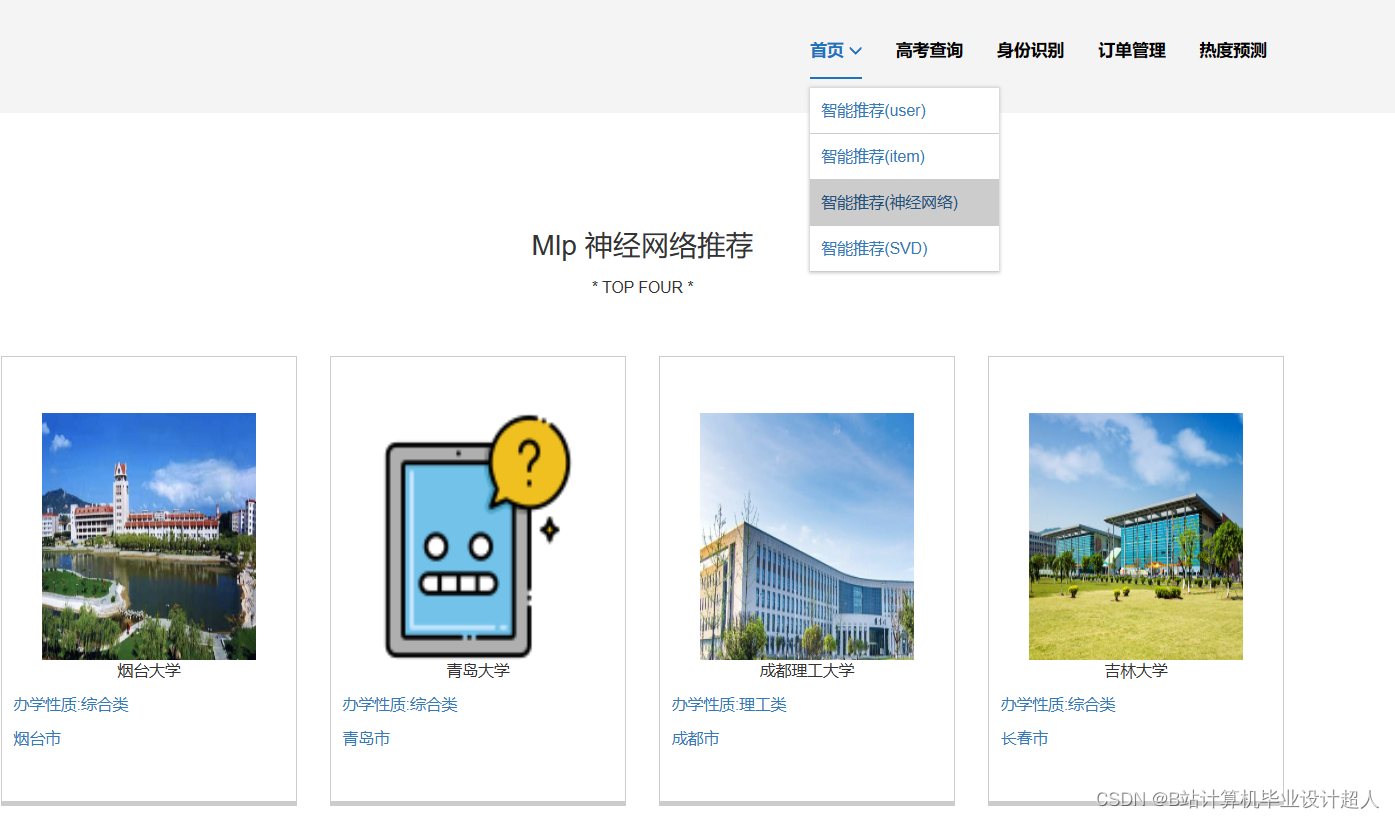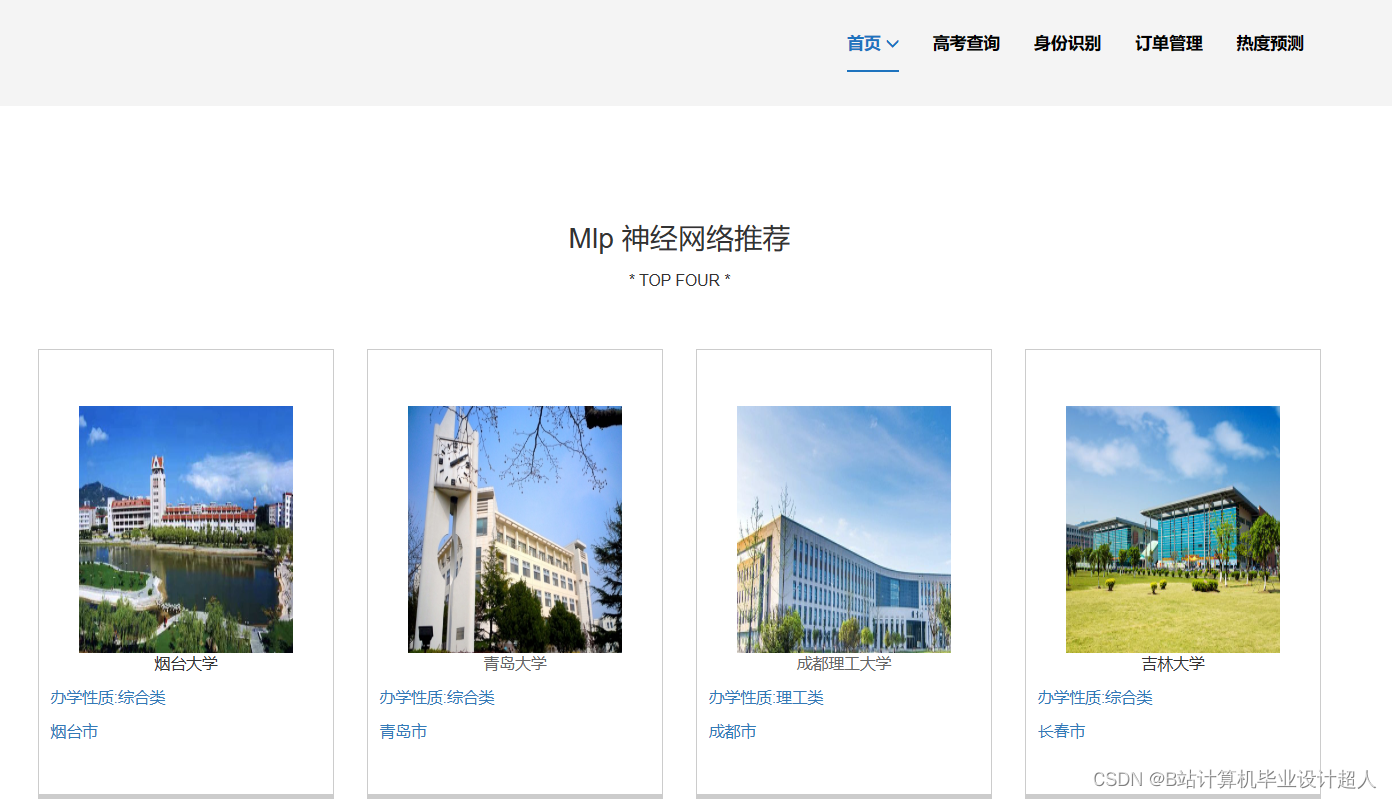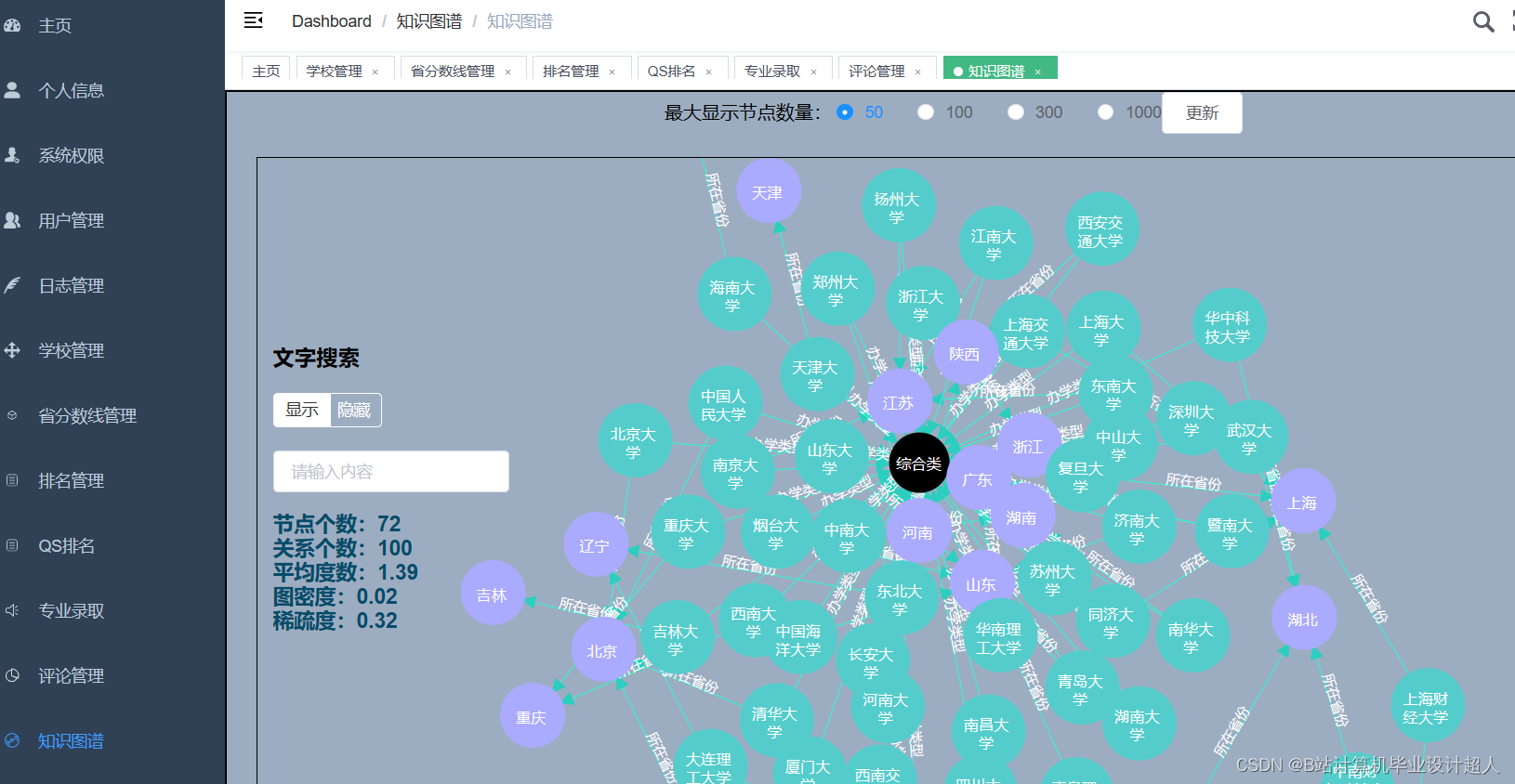毕业设计(论文)任务书
毕业设计(论文)题目: 基于大数据的高考志愿推荐系统
设计(论文)的主要内容与要求: 主要内容: 高考数据推荐与可视化系统主要是基于大数据技术开发,使用Python爬虫、Spark分析、人物画像、短支付宝沙箱支付、身份证自动识别、推荐算法-协同过滤算法(基于用户、基于物品全实现)组合技术完整整个项目的开发,同时使用SpringBoot框架,前端开发主要使用Html与Css的结合来进行页面的展示与布局;使用MySQL来进行数据的存储,通过整合MyBatis来进行对后台系统数据的管理,以及前端与数据库中数据的查取;利用Echarts进行数据的可视化分析。 主要要求: (1)高考数据推荐与可视化系统的开发流程及步骤 (2)高考数据推荐与可视化系统界面的设计 (3)高考数据推荐与可视化系统前后端数据交互的方式 (4) 关系型数据库的设计 (5)高考数据推荐与可视化系统安全性的设计 (6)高考数据推荐与可视化系统的维护 |
|||
进 度 安 排 |
|||
序号 |
设计(论文)工作内容 |
起止时间 |
|
1 |
完成毕业设计(论文)工作的动员、题目征集、指导教师遴选、题目入库、学生选题及指导教师任务书下达 |
2021.10.15-2021.11.15 |
|
2 |
毕业设计(论文)的开题 |
2021.11.15-2021.11.24 |
|
3 |
进行毕业设计任务 撰写论文 |
2021.11.25-2022.04.10 |
|
4 |
毕业设计(论文)的中期检查 |
2022.04.11-2022.04.15 |
|
5 |
进行毕业设计任务 撰写论文 |
2022.04.16-2022.05.20 |
|
6 |
毕业设计(论文)的查重、评阅、交叉评阅、答辩、成绩评定和成绩录入工作 |
2022.05.21-2022.06.17 |
|
7 |
优秀毕业设计(论文)选拔 |
2022.06.18-2022.06.24 |
|
8 |
毕业设计(论文)文档材料归档 |
2022.06.25-2022.07.08 |
|
主要参考文献: [1]刘昊,李民.基于SSM框架的客户管理系统设计与实现[J].软件导刊,2017,16(07):87-89 [2]孙乐康.基于SSM框架的智能Web系统研发[J].决策探索(中),2019(05):93 [3]明日科技.Java从入门到精通(第3版).清华大学出版社.2014 [4]王金龙,张静.基于java+Mysql的高校慕课(MOOC)本系统设计[J].通讯世界,2017,(20):276-277. [5] 徐雯,高建华.基于Spring MVC及MyBatis的Web应用框架研究[J].微型电脑应用,2012,28(07):1-4+10 [6] 先巡,袁军.Ajax/Javascript在网页中的特效应用[J].黔南民族师范学院学报,2019,39(S1):100-103 [7] 王琴.基于Bootstrap技术的高校门户网站设计与实现[J].哈尔滨师范大学自然科学学报,2017,33(03):43-48 [8] 佘青.利用Apache Jmeter进行Web性能测试的研究[J].智能与应用,2012,2(02):55-57 [9] 蒲冬梅.软件项目可行性分析评审的要点[J].医院技术与软件工程,2017(24):54-55 [10]李丹. 派遣信息网络管理平台设计与实现[J]. 软件导刊,2016,15(03):97-98. [11] 王琴.基于Bootstrap技术的高校门户网站设计与实现[J].哈尔滨师范大学自然科学学报,2017,33(03):43-48 [12]周寅,张振方,周振涛,张杨,基于Java Web的智慧医疗问诊管理系统的设计与应用[J].中国医学装备,2021,18(8):132-135. [13]王福东,程亮.基于传统组态软件与Java相结合的水位监测分析系统[J].自动化技术与应用,2021,40(9):24-28. [14]朱姝.Java程序设计语言在软件开发中的运用初探[J].医院测试,2021,(21):72-74. [15]刘震林,喻春梅.基于MVC模式的JAVA Web开发与实践应用研究[J].网络安全技术与应用,2021,(1):57-58. |
|||
指导教师签字: 2021年 11 月 13 日 |
学生签字: 2021年 11 月 14 日 |
||









核心算法代码分享如下:
from flask import Flask, request
import json
from flask_mysqldb import MySQL
# 创建应用对象
app = Flask(__name__)
app.config['MYSQL_HOST'] = 'bigdata'
app.config['MYSQL_USER'] = 'root'
app.config['MYSQL_PASSWORD'] = '123456'
app.config['MYSQL_DB'] = '2412_gaokao'
mysql = MySQL(app) # this is the instantiation
@app.route('/tables01')
def tables01():
cur = mysql.connection.cursor()
cur.execute('''SELECT * FROM table01''')
#row_headers = [x[0] for x in cur.description] # this will extract row headers
row_headers = ['level3_name','bk_num','zk_num'] # this will extract row headers
rv = cur.fetchall()
json_data = []
#print(json_data)
for result in rv:
json_data.append(dict(zip(row_headers, result)))
return json.dumps(json_data, ensure_ascii=False)
@app.route('/tables02')
def tables02():
cur = mysql.connection.cursor()
cur.execute('''SELECT * FROM table02''')
#row_headers = [x[0] for x in cur.description] # this will extract row headers
row_headers = ['province_name','score'] # this will extract row headers
rv = cur.fetchall()
json_data = []
#print(json_data)
for result in rv:
json_data.append(dict(zip(row_headers, result)))
return json.dumps(json_data, ensure_ascii=False)
@app.route('/tables03')
def tables03():
cur = mysql.connection.cursor()
cur.execute('''SELECT * FROM table03''')
#row_headers = [x[0] for x in cur.description] # this will extract row headers
row_headers = ['batch_name','num'] # this will extract row headers
rv = cur.fetchall()
json_data = []
#print(json_data)
for result in rv:
json_data.append(dict(zip(row_headers, result)))
return json.dumps(json_data, ensure_ascii=False)
@app.route('/tables04')
def tables04():
cur = mysql.connection.cursor()
cur.execute('''SELECT * FROM table04''')
#row_headers = [x[0] for x in cur.description] # this will extract row headers
row_headers = ['spname','num'] # this will extract row headers
rv = cur.fetchall()
json_data = []
#print(json_data)
for result in rv:
json_data.append(dict(zip(row_headers, result)))
return json.dumps(json_data, ensure_ascii=False)
@app.route("/getmapcountryshowdata")
def getmapcountryshowdata():
filepath = r"D:\\hadoop_spark_hive_gaokao_fenxi_vmvare2024\\server\\data\\maps\\china.json"
with open(filepath, "r", encoding='utf-8') as f:
data = json.load(f)
return json.dumps(data, ensure_ascii=False)
@app.route('/tables05')
def tables05():
cur = mysql.connection.cursor()
cur.execute('''SELECT * FROM table05''')
#row_headers = [x[0] for x in cur.description] # this will extract row headers
row_headers = ['province_name','num'] # this will extract row headers
rv = cur.fetchall()
json_data = []
#print(json_data)
for result in rv:
json_data.append(dict(zip(row_headers, result)))
return json.dumps(json_data, ensure_ascii=False)
@app.route('/tables06')
def tables06():
cur = mysql.connection.cursor()
cur.execute('''SELECT * FROM table06''')
#row_headers = [x[0] for x in cur.description] # this will extract row headers
row_headers = ['name','rank'] # this will extract row headers
rv = cur.fetchall()
json_data = []
#print(json_data)
for result in rv:
json_data.append(dict(zip(row_headers, result)))
return json.dumps(json_data, ensure_ascii=False)
@app.route('/tables07')
def tables07():
cur = mysql.connection.cursor()
cur.execute('''SELECT * FROM table07''')
#row_headers = [x[0] for x in cur.description] # this will extract row headers
row_headers = ['name','rank'] # this will extract row headers
rv = cur.fetchall()
json_data = []
#print(json_data)
for result in rv:
json_data.append(dict(zip(row_headers, result)))
return json.dumps(json_data, ensure_ascii=False)
@app.route('/tables08')
def tables08():
cur = mysql.connection.cursor()
cur.execute('''SELECT * FROM table08''')
#row_headers = [x[0] for x in cur.description] # this will extract row headers
row_headers = ['zslx_name','num'] # this will extract row headers
rv = cur.fetchall()
json_data = []
#print(json_data)
for result in rv:
json_data.append(dict(zip(row_headers, result)))
return json.dumps(json_data, ensure_ascii=False)
@app.route('/tables09')
def tables09():
cur = mysql.connection.cursor()
cur.execute('''SELECT * FROM table09''')
#row_headers = [x[0] for x in cur.description] # this will extract row headers
row_headers = ['name','view_total'] # this will extract row headers
rv = cur.fetchall()
json_data = []
#print(json_data)
for result in rv:
json_data.append(dict(zip(row_headers, result)))
return json.dumps(json_data, ensure_ascii=False)
if __name__ == "__main__":
app.run(debug=True)